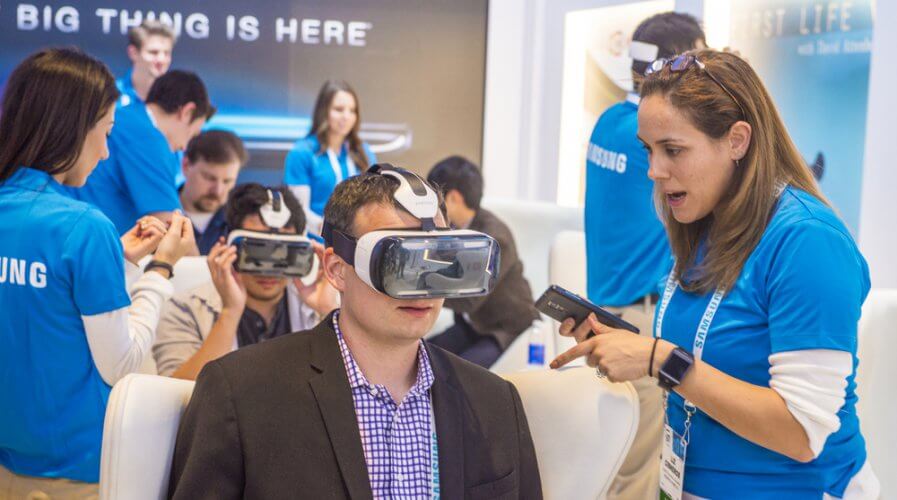
Building brand loyalty? VR can work wonders for your brand. Source: Shutterstock
3 ways technology can help your brand build a loyal following
LOYALTY is something brands have always been fascinated about. In fact, it is often seen as the ultimate competitive edge that any company can have.
In many ways, it can be said that the ultimate reward for a company digitally transforming itself and climbing the digital maturity curve is the increase in loyalty it enjoys as a result.
Since loyalty is one of the most important things when trying to retain customers and earn repeat business, there are several studies trying to understand its impact on organizations that successfully manage loyalty.
According to a Bain & Company study, for example, increasing customer retention rates by a mere 5 percent can lead to a 25 percent to 95 percent increase in profit.
Unfortunately, despite this evidence, only 18 percent of companies make retention — and by extension, loyalty — a top priority.
In the past, earning brand loyalty meant working with customers to provide a great product and after-sales service, at a reasonable cost.
In the internet age, with the market absolutely saturated and constantly competing on price, consumers are spoilt with choice.
With e-commerce and retail businesses vying for attention with discounts and offers everywhere, every day, earning loyalty is challenging (if brands have time to think about it in the first place)
Technology is the problem and the solution
In the constantly evolving consumer market, technology might seem to be the disruptor but it can also be a key differentiator for businesses looking to enhance brand loyalty.
Here are three ways marketers can leverage technology to help build brand loyalty:
# 1 | Providing your customer with a personalized experience
Many brands are using artificial intelligence (AI) to extract valuable insights about a customers behavior from data. Such insights allow brands to deliver personalized, targeted messaging to each individual customer.
Research has shown that 80 percent of consumers are more likely to do business with a company if it offers some kind of personalization.
Thus, the need for companies to gather insights from their customer behavior in order to deliver a more value to customers in a crucial need in the development of brand loyalty.
It’s all about understanding the current needs and wants of your customers, and being able to respond to them as quickly as possible.
# 2 | Creating a memorable experience
A key to ensuring customers come back is to create a memorable experience for them. And to do this, businesses can leverage the latest technologies.
Many brands are looking to raise customer engagement through the use of VR technology. It is being used in multiple ways to improve the customer journey both instore and out.
On Singles Day, one of China’s biggest shopping holidays, e-commerce giant Alibaba allowed consumers to virtually shop through a VR headset.
In the comfort of their own homes, shoppers could wander the aisles of Macy’s virtual store, take a close look at products, and make a purchase simply by looking.
The e-commerce giant is also leading the way in creating AR experiences. For example, last year Alibaba teamed up with Starbucks to create its first-ever in-store AR experience. Using an app, customers can walk around the store and point at different features to learn more information.
# 3 | Focusing on convenience
Today’s customers want convenience. Companys who wish to build strong brand loyalty seek to provide services that effortlessly fit into the lives of customers, instead of simply creating offerings and expecting consumers to seek them out when needed.
Businesses must offer consumers convenience when it comes to payment, speed, and options.
Alibaba epitomizes convenience, which is what has led to its immense success. The e-commerce behemoth has a growing chain of cashless supermarkets named Hema. The theme? Convenience.
Shoppers can use their phones to pay for their food, chefs can cook their groceries on demand, they can have their shopping delivered to their homes within 30 minutes, they can use the Hema app to scan products to find information such as the product’s origin, nutritional information, and recipe suggestions, just to name a few examples.
So, is brand loyalty actually dying? While it has definitely declined in recent years, it is unlikely to disappear any time soon.
Rather, the way in which businesses must approach brand loyalty has definitely changed. But with the right understanding of what your customers truly want, along with the help of technological solutions, any business can secure loyalty from its customers.
READ MORE
- Ethical AI: The renewed importance of safeguarding data and customer privacy in Generative AI applications
- How Japan balances AI-driven opportunities with cybersecurity needs
- Deploying SASE: Benchmarking your approach
- Insurance everywhere all at once: the digital transformation of the APAC insurance industry
- Google parent Alphabet eyes HubSpot: A potential acquisition shaping the future of CRM






